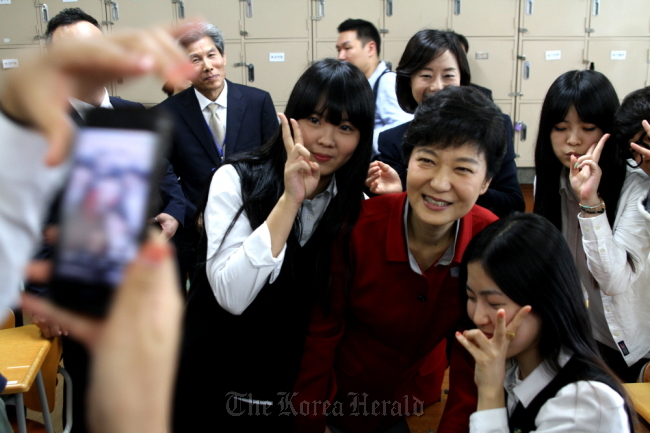Following is the fourth in a series of articles on President-elect Park Geun-hye’s key policies. ― Ed.
Building a better education system is a quest for all governments, but the pressure is ever more intense and urgent for President-elect Park Geun-hye.
Private education costs, added to swelling household debt, are weighing heavily on the whole economy. Mediocre classes are threatening to undermine national competitiveness. Cutthroat competition for academic excellence is driving stressed students to suicide.
Education reform topped Park’s agenda during the campaign with sweeping pledges to cut private tutoring, upgrade public education and lighten test burdens for children.
Building a better education system is a quest for all governments, but the pressure is ever more intense and urgent for President-elect Park Geun-hye.
Private education costs, added to swelling household debt, are weighing heavily on the whole economy. Mediocre classes are threatening to undermine national competitiveness. Cutthroat competition for academic excellence is driving stressed students to suicide.
Education reform topped Park’s agenda during the campaign with sweeping pledges to cut private tutoring, upgrade public education and lighten test burdens for children.

But experts still raise questions about whether the incoming leader can turn all her pledges into reality while, addressing likely side effects and costs, which frustrated attempts by her predecessors.
Parents spent some 20.1 trillion won ($18.5 billion) on the private education of primary and secondary students in 2011 alone.
Her key solution is crowding out cram schools by enhancing school education and curtailing examinations to a degree where parents will feel little need for costly additional studies.
Park said she will impose a new rule prohibiting primary and secondary schools from writing exam questions that require students to study at a higher level as early as six months in advance.
But it is unclear whether the rule will guide schools to stop students from cramming for advanced studies, experts said.
“It’s great to see Park aim to reduce the pressure on students,” said Seoul Metropolitan Council member Kim Hyoung-Tae.
“(The president-elect) said that students won’t be allowed to study six months ahead of their school curriculum. But it will be very difficult to distinguish between essential preparation study and unnecessary pre-study,” he said.
Kim, who is also a member of the council’s education committee, noted that Park’s idea may widen the gap between public schools and so-called prestigious elite schools.
“Specialized schools, such as a science high school, teach students to gain deeper knowledge in science and math. So I’m worried about whether the new rule will only weaken the competiveness of public schools,” he added.
Also, Park, as part of plans to strengthen public education, plans to introduce “all-day” service in elementary schools nationwide by expanding after-school classes.
The majority of elementary school classes currently run until 2 p.m., but she promised to offer extracurricular classes outside of regular school hours until 10 p.m.
The president-elect plans to provide all-day service to first and second year students by 2014, and to extend it to all elementary school levels by 2016.
But the education ministry is still not clear about the costs and number of qualified teachers required for the all-day school service.
The ministry currently runs 1,700 after-school classes nationwide and it plans to add 300 classes by next year with an additional budget of 5 billion won ($4.6 million), an official from the ministry said.
“We may need more extra budget, but we don’t know yet as the-president elect and her team have no fixed plans at the moment,” he said.
But the problem is, observers say, the all-day free school service may help ease concerns for working parents, but have little effect in reducing the number of children going to hagwon, or private leaning institutes.
“The after-school programs are mostly arts and physical education, and their role is fairly limited,” said Kim Seung-hyun of the nonprofit organization Private Education Free World.
“I think it will have little or no impact on reducing private education costs.”
He pointed out that private education has already expanded from middle and elementary schools, but Park made no mention of the excessive competition for prestigious, so-called privileged high schools.
Apart from curbing private education, Park pledged to allow middle-school students to spend a semester without tests and an evaluation process to focus on their career planning.
The Seoul Metropolitan Council member Kim said that Park should present strong ideas to lead a systematic change for college admission.
“The root cause of all this fuss about private education is the competitive education system. Without changing this, (the president-elect’s) efforts to change our education will go nowhere,” he added.
By Oh Kyu-wook (596story@heraldcorp.com)
-
Articles by Korea Herald



















